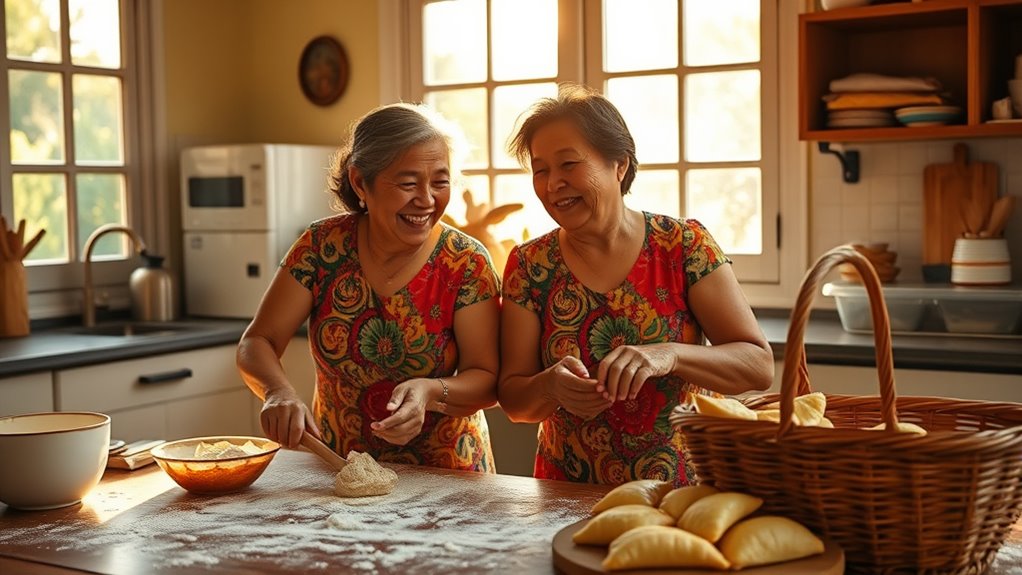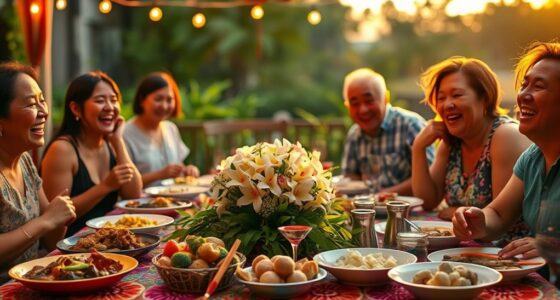A shared tradition among Filipinas forms a strong bond rooted in our history and values. You see, family and community shape your identity, creating a vast support network that fosters resilience. Festivals celebrate our culture, enhancing social connections and honoring our heritage. Through both traditional roles and contemporary contributions, Filipinas showcase their strength and creativity. When you explore these traditions, you’ll uncover the lasting impact they have on our lives and connections.
Key Takeaways
- Shared traditions, such as festivals, foster community engagement and strengthen bonds among Filipinas through collective celebration and cultural pride.
- Intergenerational storytelling preserves values and traditions, reinforcing a sense of identity and belonging within Filipina communities.
- Family ties extend beyond immediate relatives, creating a robust support network that deepens connections among Filipinas.
- Participation in cultural events encourages collaboration and solidarity, empowering women to advocate for their rights and recognition.
- Cultural practices and shared experiences promote resilience, allowing Filipinas to navigate modern challenges while honoring their heritage.
Historical Roots of Filipina Empowerment
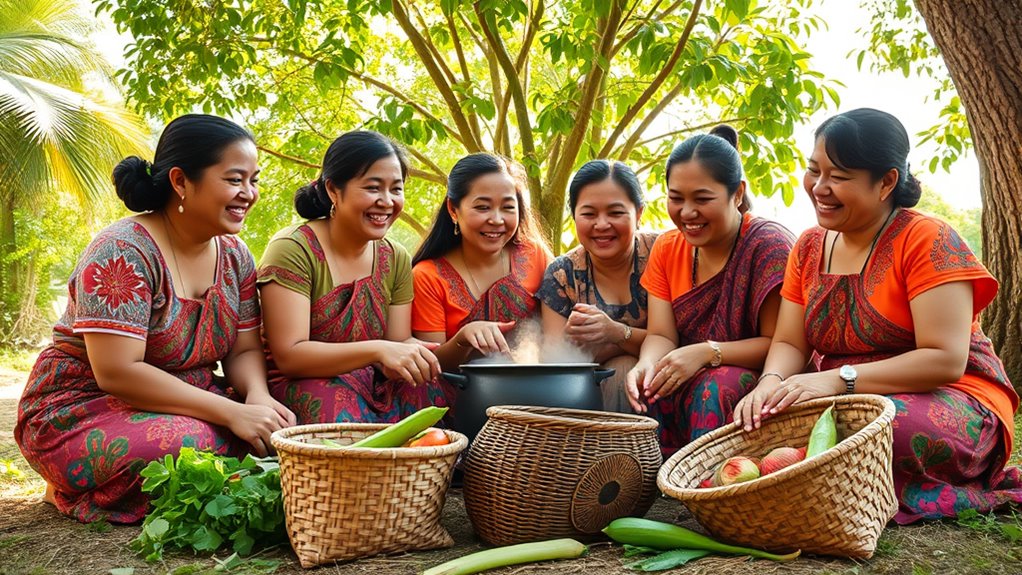
Although many people may not realize it, the historical roots of Filipina empowerment stretch back to pre-colonial societies where women held significant power. In these communities, women enjoyed bilateral kinship structures, allowing them to own property and engage in trade. They could even become village chiefs when no male heirs existed.
Women also held spiritual roles as medicine women and high-priestesses, showcasing their influence. Unfortunately, Spanish colonization diminished this autonomy, casting women into submissive roles.
Yet, the legacy of empowered women persisted, inspiring future generations. Understanding this rich history helps you appreciate the ongoing fight for equality today, reminding you that the spirit of Filipina empowerment is deeply embedded in your cultural heritage.
The Role of Family and Community in Shaping Identity
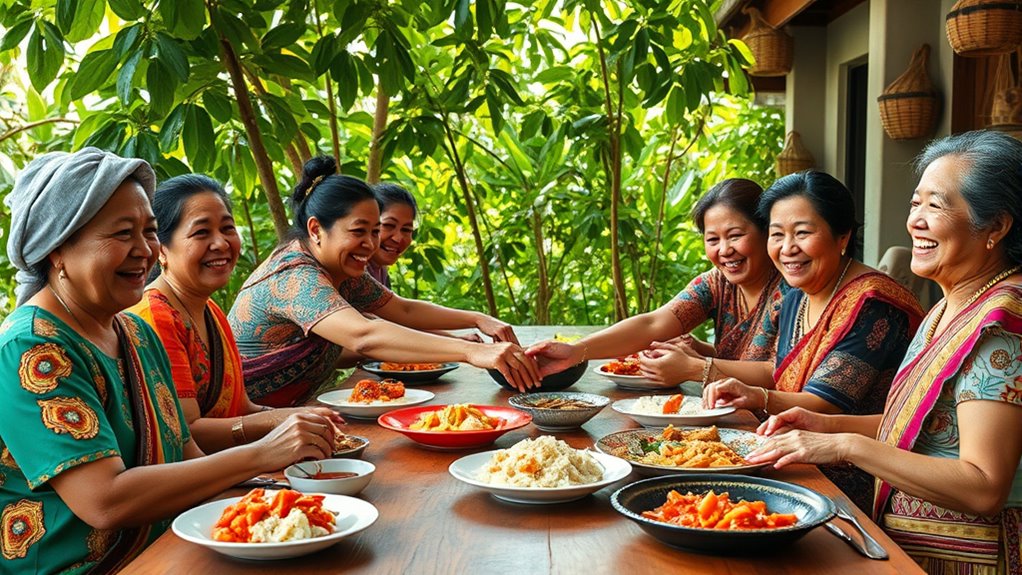
The legacy of empowered Filipinas not only stems from individual strength but also from the collective support of family and community. Your identity is shaped by the values, traditions, and stories passed down through generations.
In Filipino culture, family extends beyond immediate relatives, creating a vast support network that nurtures loyalty and obligation. Living closely with extended family fosters intergenerational bonding, reinforcing respect and obedience from a young age.
Community plays an equally essential role, promoting social cohesion and shared cultural identities. The sense of “kapamilya” instills belonging and solidarity, while collective responsibility guarantees everyone’s well-being.
Together, family and community cultivate a strong foundation for your identity, enriching your journey as a Filipina.
Cultural Influences on Women’s Roles
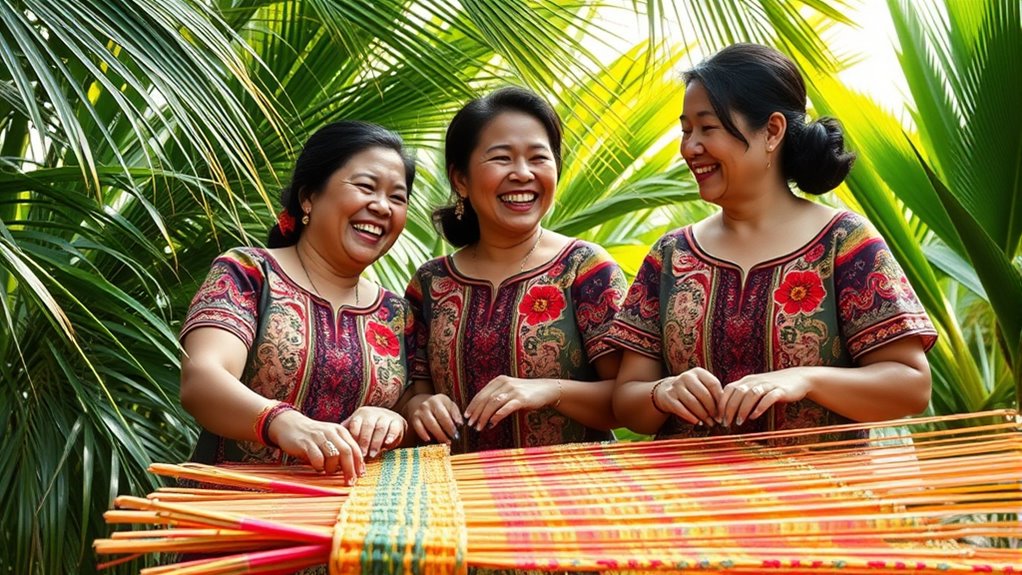
Cultural influences have considerably shaped women’s roles in the Philippines, intertwining with the nation’s history and identity. The 300 years of Spanish rule introduced a patriarchal system, limiting women’s authority and highlighting maternal roles.
In contrast, the American colonial period opened educational doors for women, allowing them to enter teaching and public service. Meanwhile, Chinese trade and marriages reinforced some patriarchal norms, while Malay cultures added regional variations to women’s roles.
Additionally, Catholicism solidified traditional gender expectations through moral teachings. These diverse influences have created a complex landscape where modern Filipinas navigate between tradition and empowerment, reflecting resilience and adaptability as they challenge societal norms and pursue equal opportunities. The disorder arises from a combination of biological, psychological, and environmental factors that continue to affect women’s mental health and social roles in contemporary society.
Traditional Gender Roles and Responsibilities
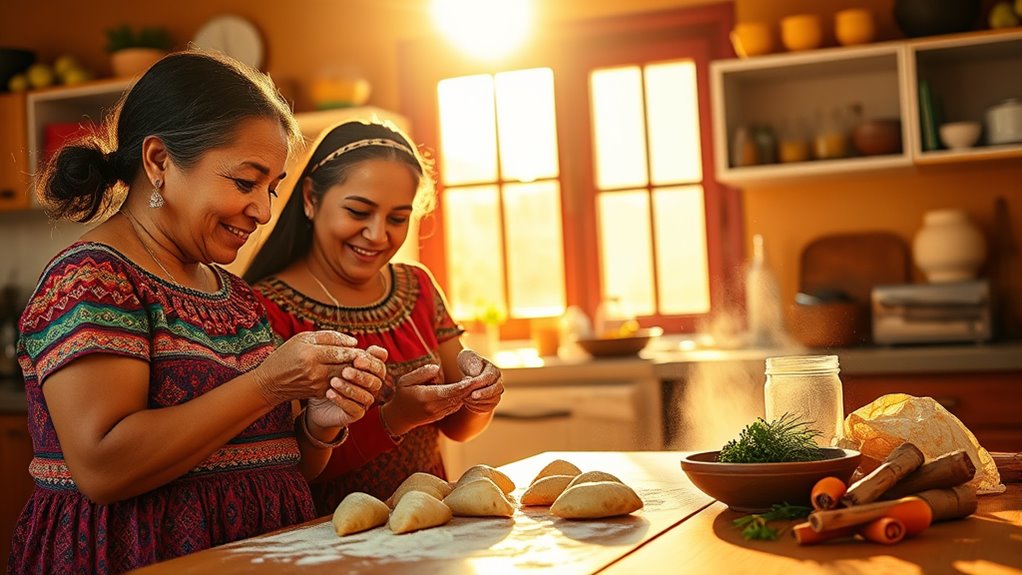
In the Philippines, traditional gender roles have long dictated the responsibilities men and women take on within families and society. Men typically hold dominant positions, acting as the breadwinners and decision-makers, while women manage household chores and care for children.
From birth, you’re expected to emulate the roles of your parents—men pursuing income-generating activities and women focusing on domestic tasks. This patriarchal structure limits women’s participation in higher roles within business and politics, reinforcing family priorities centered on caregiving.
Despite some shifts due to modernization, these roles remain deeply ingrained in cultural norms. You might notice that while men provide financially, women guarantee the household runs smoothly, reflecting a long-standing division of responsibilities in Filipino culture.
Contemporary Contributions of Filipinas
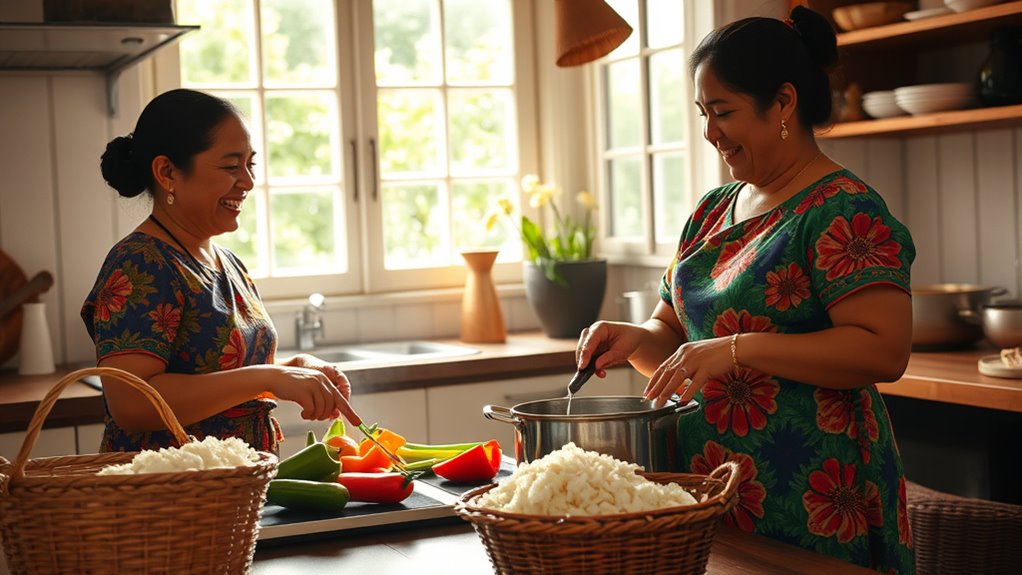
While traditional gender roles have shaped Filipina identities for generations, contemporary Filipinas are redefining their contributions across various fields.
In the arts, they’re pushing boundaries and gaining global recognition through innovative and socially relevant works. Emotional intelligence enhances their ability to connect with audiences and express complex themes. This creative expression often reflects the emotional and psychological growth of individuals as they navigate societal challenges. Moreover, the rising popularity of cryptocurrency regulations has opened new avenues for artistic expression and financial independence.
In business, more Filipinas are stepping into leadership roles, driving economic growth and advocating for women’s empowerment.
The scientific community also benefits from their involvement, as they contribute to groundbreaking research in agriculture and space technology.
Education sees Filipinas leading initiatives that promote sustainability and modern curricula.
By engaging in collaborative projects, they foster community connections and address pressing social issues. These contributions not only enhance their visibility but also shape a more equitable future for all. Additionally, many Filipinas are actively involved in successful co-parenting initiatives that help strengthen family bonds and promote child well-being.
Social and Cultural Identity Through Shared Practices
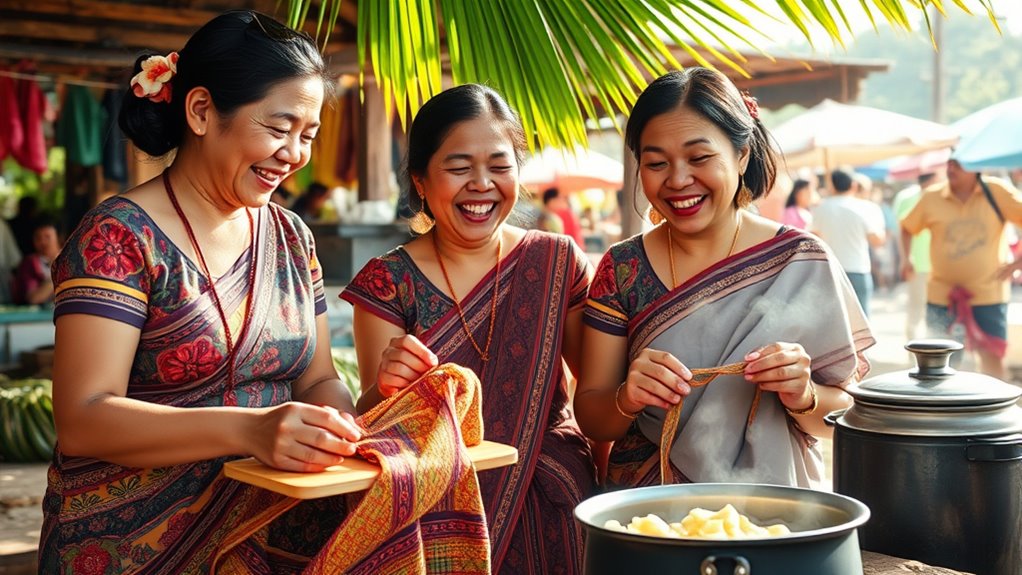
Shared practices play an essential role in shaping social and cultural identity among Filipinos, as they foster a sense of belonging and community. From vibrant fiestas to intimate kwentuhan, these traditions unite you with others, creating bonds that transcend regional and ethnic differences. The core values of respect and hospitality guide your interactions, making every gathering an opportunity to strengthen relationships. Through music, dance, and storytelling, you preserve cultural heritage while celebrating diversity. Engaging in these practices often leads to continuous learning and personal growth, as they encourage individuals to adapt and enrich their understanding of their culture. Additionally, these gatherings often involve sustainable practices that reflect the Filipino value of caring for the environment. Understanding the importance of financial health can also enhance your ability to participate in these communal events.
Food plays a significant role in these gatherings, often showcasing cultural breakfast traditions that highlight the diversity of Filipino cuisine.
Kinship ties further enrich your social fabric, emphasizing group harmony over individual needs. Even food acts as a unifier, bringing people together to share in culinary delights. These cultural traditions not only reflect your identity but also nurture a collective spirit that defines the Filipino experience.
Evolving Gender Norms and Their Impact
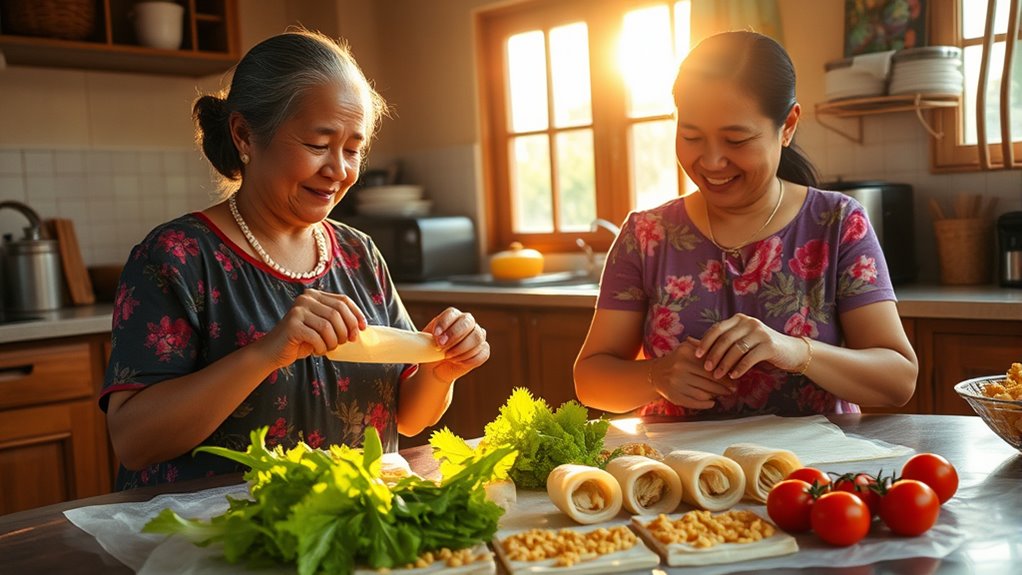
As you explore the rich tapestry of Filipino culture, you’ll see that evolving gender norms appreciably shape social dynamics and individual identities. Traditionally, men have dominated roles while women have been caregivers, but significant changes are underway.
Legal advancements and educational equality have empowered women, allowing them to participate more actively in politics and decision-making. Yet, challenges remain; societal expectations still pressure women into traditional roles, affecting their career advancement.
The evolving family dynamics reflect this shift, with shared responsibilities becoming more common. Although progress is evident, the resistance to change highlights the ongoing struggle for true equality.
Understanding these complexities helps you appreciate the resilience and strength of women in modern Filipino society.
Celebrating Our Heritage: Festivals and Community Bonds
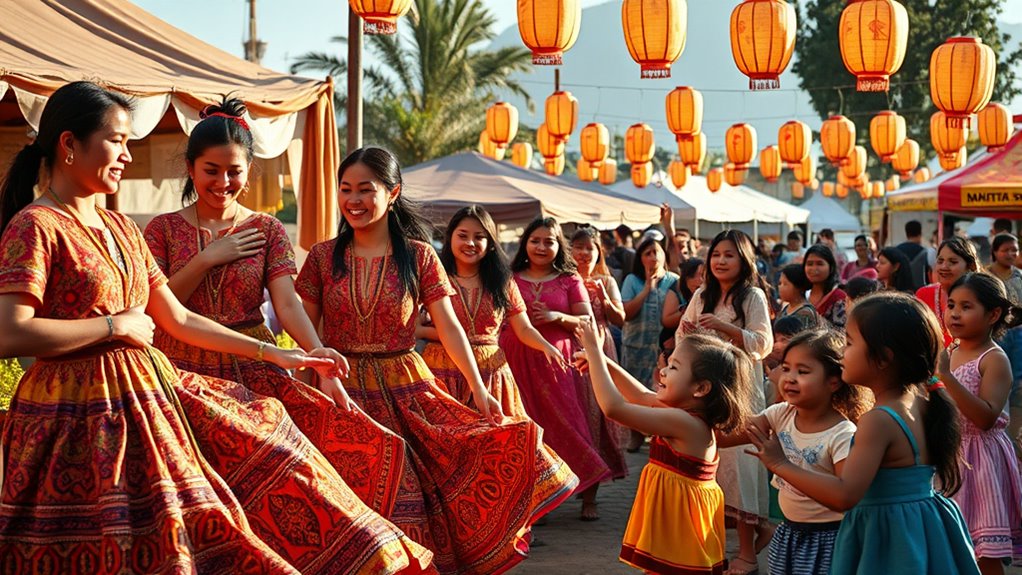
Festivals in the Philippines serve as vibrant celebrations that not only honor cultural traditions but also strengthen community bonds. Events like the Ati-Atihan and Sinulog Festivals invite you to join in the dance and rhythm, creating shared experiences.
You’ll feel the energy as locals and visitors alike participate in lively processions, from the fluvial displays in Bocaue to the self-flagellation rituals in Pampanga. These festivals not only preserve our heritage but also boost the local economy, attracting tourists and showcasing artisan crafts. Additionally, they contribute to social justice movements that advocate for the rights and recognition of local artists and communities.
Each celebration reminds you of your roots, reinforcing connections with your community. By participating, you’re not just a spectator; you’re an integral part of a living tradition that continues to thrive across generations.
Frequently Asked Questions
How Can I Support Filipinas in Their Professional Endeavors?
You can support Filipinas in their professional endeavors by advocating for equal opportunities and fair wages.
Encourage mentorship programs and networking events that connect them with industry leaders. Promote access to education and training to enhance their skills.
Additionally, champion policies that improve childcare options and create inclusive workplaces.
What Are Common Challenges Faced by Modern Filipinas Today?
Steering through life as a modern Filipina can feel like walking a tightrope—balancing cultural expectations and personal ambitions.
You face challenges like gender biases that limit career growth and domestic responsibilities that often fall disproportionately on your shoulders. Economic instability and limited access to education further complicate your journey.
Legal protections exist, but inconsistent enforcement leaves you vulnerable. Addressing these issues requires resilience, unity, and a commitment to advocating for change within your communities.
How Do Filipinas Balance Tradition and Modernity in Daily Life?
Balancing tradition and modernity in daily life isn’t easy for you. You navigate respect for family values while embracing contemporary influences.
You often find yourself blending cultural practices with modern conveniences, like using social media to connect with loved ones. Celebrating family gatherings helps you maintain those traditions, while adapting to new challenges keeps your identity dynamic.
Open communication with family lets you honor your roots while pursuing your own aspirations.
Are There Organizations Promoting Filipina Empowerment?
Yes, there are several organizations promoting Filipina empowerment.
You can engage with groups like Amarela Philippines, which advocates for reproductive health and rights, or Pink Lips PH, focusing on youth-driven activism.
Girls Got Game PH empowers young women through sports, while Gabriela Philippines pushes for policy reforms in women’s rights.
SPARK offers education and legal assistance to foster gender equality.
Each organization plays a crucial role in uplifting women in various aspects of life.
How Can I Learn More About Filipino Cultural Practices?
To learn more about Filipino cultural practices, immerse yourself in the experience. Attend cultural festivals like MassKara or Kadayawan, where you can witness vibrant traditions firsthand.
Engage with local Filipino communities or join educational courses focused on Filipino studies. Reading historical texts will deepen your understanding, while learning Filipino languages like Tagalog connects you to your roots.
Don’t forget to share and exchange family stories to keep the culture alive and thriving!
Conclusion
In celebrating our shared traditions, you’re not just honoring the past; you’re empowering the future. Some may argue that old customs can hold us back, but look closer: these practices forge connections and foster resilience. By embracing our cultural heritage, you’re part of a legacy that uplifts women and strengthens communities. So, let’s celebrate the vibrant tapestry of Filipina identity together, honoring our roots while boldly stepping into a brighter, more inclusive tomorrow.
